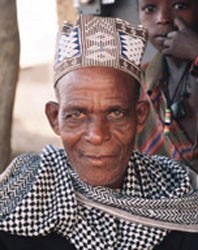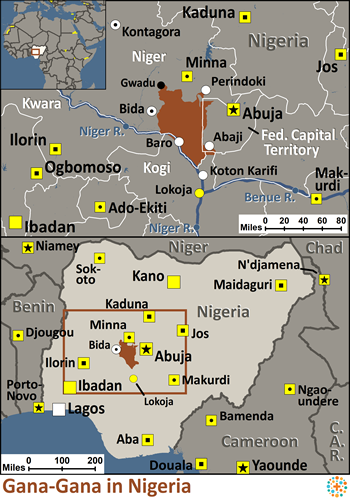The Gana-Gana people, located in Nigeria, have a history that is intertwined with the broader dynamics of the region. They are linked to ancient migrations, and they have historically interacted with neighboring ethnic groups through trade and alliances. The Gana-Gana have experienced various socio-political changes over the centuries, including the impact of colonialism and the spread of Islam in the region.
The Gana-Gana people primarily rely on agriculture for their livelihood, cultivating crops such as millet, sorghum and yams. Small-scale trading and animal husbandry also contribute to their economy.
Villages are typically composed of family compounds, with houses constructed from local materials like mud and thatch. Social structures are organized around extended families, with elders playing a significant role in decision-making processes. Daily life involves communal activities, and traditional crafts such as pottery and weaving are still practiced.
Islam is the predominant religion among the Gana-Gana people, and Islamic practices influence many aspects of their daily lives. Religious leaders hold considerable authority, guiding both spiritual and social matters within the community. Despite the dominance of Islam, elements of traditional beliefs persist, particularly in the veneration of ancestors and the observance of certain rituals associated with nature. These traditional practices often coexist with Islamic customs.
The Gana-Gana people face challenges related to access to basic services. Healthcare facilities and educational opportunities are limited, particularly in rural areas. Economic development beyond subsistence agriculture is needed to provide sustainable livelihoods and improve living standards. Infrastructure such as roads and communication networks require significant improvement to enhance connectivity and access to resources. Additionally, initiatives that address food security and the environmental impacts of agriculture are crucial for the long-term well-being of the Gana-Gana people.
Pray that God sends many loving workers to the Gana-Gana people.
Pray that God would work in the hearts of the Gana-Gana to give them a hunger to hear God's word, a solid understanding of Jesus Christ, and the determination to believe the message regardless of the cost.
Pray for Christian believers to be strong in the face of any form of persecution.
Scripture Prayers for the Gana-Gana in Nigeria.
Nigeria Cultural Foundation. (2023). Ethnographic Overview of the Gana-Gana People. Retrieved from nigeriaculturalfoundation.org
UNDP Nigeria. (2023). Development Challenges in Rural Nigeria. Retrieved from in.undp.org
| Profile Source: Joshua Project |

























